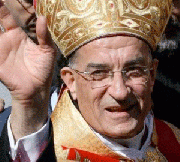BEIRUT — A heated debate has erupted in Lebanon over controversial remarks by the head of the nation’s Maronite Christians, who has warned an end to Syria’s regime threatens Christians across the Middle East.

|
| Patriarch Beshara Butros Rai: “Regimes described as dictatorial… could lead to civil war, in which Christians would be the biggest victims.” |
During his first visit to France last week, Patriarch Beshara Butros Rai urged that Syrian President Bashar al-Assad — once the arch-enemy of Lebanon’s Maronites — be given a chance to implement reforms, saying the “poor man cannot work miracles.”
Assad’s regime has cracked down on a string of unprecedented protests across his country, killing more than 2,600 civilian protesters since the uprising began in March, according to the United Nations.
Many of Syria’s minority Christians, which include Maronites, are concerned that Muslim extremists could rise to power should Assad’s regime collapse.
Rai last week echoed that fear, voicing concern of a takeover by the radical Muslim Brotherhood, a movement the Syrian authorities have blacklisted for decades.
“We endured the rule of the Syrian regime. I have not forgotten that,” Rai said. “We do not stand by the regime, but we fear the transition that could follow.
“We must defend the Christian community. We too must resist.”
He later clarified his statement by telling local press he feared the fall of “regimes described as dictatorial… could lead to civil war, in which Christians would be the biggest victims.”
Lebanon’s Christians, a community that once enjoyed unparalleled political leverage, are now split on the protests rocking Syria.
Maronites allied with Hizbullah, which is supported by Syria and Iran, are backing Assad and accusing the radical Sunnis of stirring the unrest.
Other Lebanese Christians, allied with pro-Western former premier Saad Hariri, have voiced support for the anti-Assad protests.
Observers are divided on the patriarch’s stance, with some lauding it as a shield for Christians and others warning it marks a grave political faux pas.
“It was a big mistake for the patriarch to go to France, which has a history of hundreds of years of support for Maronites, and say the Assad regime must be protected at a time when the Assad regime is breaking down,” said political commentator and author Elias al-Zoghbi.
But others argue Rai is doing what is necessary to ensure the survival of his dwindling community.
“The patriarch is not enamored with the regime of Bashar al-Assad, nor is he blind to the atrocities Lebanon suffered as a result of that regime’s military presence in Lebanon for 30 years,” said analyst and columnist Jean Aziz.
“He is not defending the regime but he fears that unrest in Syria will lead to civil war, which would see the Christians of Syria and Lebanon suffer the same as those of Iraq.”
Lebanon was gripped by a deadly civil war from 1975 to 1990, which saw Syria send troops in to its smaller neighbor, where they remained for 29 years.
Ahed al-Hindi, a Washington-based Syrian activist and himself a Christian, openly rejected Rai’s explanations as serving to strike fear into the hearts of Christians.
“Syrian Christians are not threatened — they have long lived side-by-side with Muslims,” said Hindi, a participant in the meetings of Syrian dissidents in Turkey.
“This is yet another tool of fear the Assad regime has created.”
And as Syrian protesters continue to brave the guns of their ruling regime, many are hoping the path will lead to democracy, the only hope for the Christians of the Middle East.
“What we are witnessing today is a transition, which often means the voices of radicals sound loudest,” said Aziz. “It’s possible that could drown out Christian minorities.
“But ultimately, the course of history is headed towards democracy.”






Leave a Reply